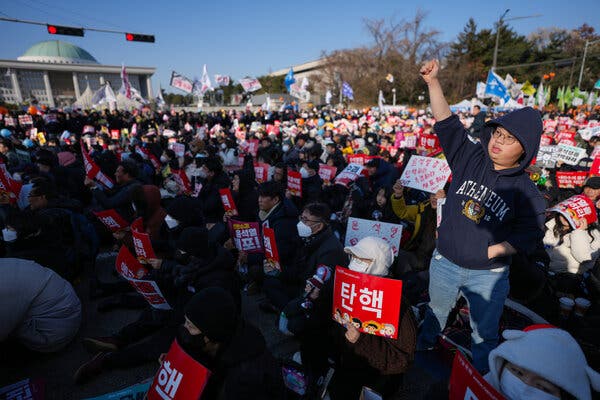Supporters of the constitutional amendments said they would curb judicial activism. Critics said judicial independence had been damaged.

After weeks of intense political maneuvering, Pakistan’s Parliament has passed a set of constitutional amendments that will overhaul the process for appointing the country’s chief justice. Critics called it an effort to rein in the Supreme Court as it has emerged as a political force in its own right and challenged Pakistan’s powerful military establishment.
The governing Pakistan Muslim League-Nawaz and other groups managed to cobble together the two-thirds majority needed to change the Constitution in a session that continued into the early hours of Monday. In fiery speeches railing against what they called judicial activism, lawmakers in the ruling coalition said the amendments would bolster the primacy of political leaders in Pakistan.
But the party of former Prime Minister Imran Khan, who is in jail on corruption charges that he denies, boycotted the vote, calling the amendments a blatant attempt to undermine judicial independence. The Supreme Court has repeatedly issued rulings pushing back on the establishment’s efforts to sideline Mr. Khan and his party, Pakistan Tehreek-e-Insaf, or P.T.I.
The amendments, which were supported by the military establishment, reflect the power struggles that have gripped Pakistan since Mr. Khan was ousted in 2022, analysts said.
Under the changes, the appointment process for the chief justice and other judges will move away from the traditional seniority-based system to one that could be swayed by political interests.
The amendments ensure that judges perceived to be loyal to Mr. Khan will be forced out of contention for the chief justice role. Some independent judges who stood up against the military’s heavy-handed tactics to push aside Mr. Khan and his party will also now be out of the running for future chief justice spots, analysts said.
“It is a dark day for democracy,” said Faisal Chaudhry, an Islamabad-based lawyer who is part of Mr. Khan’s legal team. He said that judicial overreach had now been answered by limiting judicial independence.
For most of Pakistan’s history, the courts were largely aligned with the military, disqualifying elected prime ministers and dozens of other politicians who had fallen out of favor with the generals. The Supreme Court ordered the hanging of a popular former prime minister, Zulfikar Ali Bhutto, in 1979.
Supporters of the judicial changes said they would curtail such meddling.
“The new constitutional amendments would help end the palace conspiracies to oust governments and remove prime ministers,” Prime Minister Shehbaz Sharif told Parliament.
Before the vote, Islamabad was buzzing with high drama and frenetic political activity. Akhtar Mengal, the leader of a nationalist party, the Baluchistan National Party, said that two of his party’s senators had been abducted and forced to vote for the amendments. P.T.I. also claimed that several of its members had been coerced by the military establishment into voting for the changes.
Mr. Sharif dismissed these concerns, saying that the amendments marked “a new dawn.”
See more on: Pakistan Muslim League-N, Pakistan Tehreek-e-Insaf, Supreme Court of Pakistan, Imran Khan, Shehbaz Sharif



